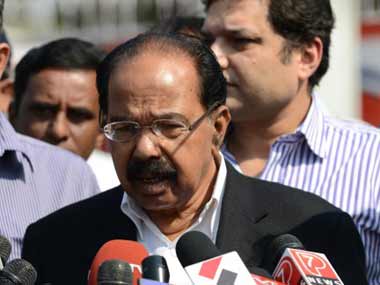Bangalore: Shortage of drinking water, lack of basic infrastructure, poor irrigation facility and so on – only 30 km away from Bangalore yet Chikkaballapura parliamentary constituency appears to be another planet altogether. Development has eluded the constituency, but it is neither a political nor a poll issue. This is where Union Minister for Petroleum & Natural Gas M Veerappa Moily and former chief minister of Karnataka HD Kumaraswamy will lock horns. While Moily is seeking re-election on a Congress ticket, JD(S) leader Kumaraswamy will be trying his luck for the first time from the constituency. Former minister BN Bachche Gowda, the local strongman, is the BJP’s candidate. Ironically, Gowda was once a die-hard supporter of the JD(S) supremo HD Deve Gowda. [caption id=“attachment_1468739” align=“alignleft” width=“380”]  Moily isn’t seen as an insider in the constituency. AFP[/caption] The caste mix of the constituency – it has 1.65 million voters – makes it prone to polarisation. While backward classes, including SC/STs, constitute around 500,000 voters. Vokkaligas, Karnataka’s second largest community, accounts for 450,000 voters. The Baliliga community, which is dominant in the constituency, makes up 300,000 voters, while minorities number over 200,000. Lingayats, the largest community in the state, have a presence of only 50,000 here. The Baliligas, who dominate the local business, hold the key to the victory of candidates. The community traditionally ensures that no powerful candidate with caste background wins in Chikkaballapura. It fears that other powerful communities will interfere in its business interests. It was the reason behind RL Jalappa winning the constituency for over two decades, despite of the fact that his Idiga community is a micro minority in the constituency. Moily is banking on backward class and Baliliga votes, supplemented by the minority vote bank of the Congress. Perceived as an ‘outsider’, he does not have a strong caste backing in the constituency. Though the voters of the constituency have their own reservations in believing claims that water will be supplied to the region through Moily’s favourite project – Yetthinahole, they don’t mind it as long as he does not indulge in power politics of the district. However, the recent development of senior Congress leader CK Jaffer Sharief quitting the party and joining hands with JD(S) is giving Moily sleepless nights. Though Bachche Gowda is a local and a Vokkaliga, he cannot rely on the minority votes, as he is contesting on BJP ticket. Besides, he belongs to the Hosadevara Vokkalu, a sub-community among Vokkaligas, which is a minority in the constituency. However, he has a strong personal network in the constituency and is aided by the Modi wave in the urban areas. Earlier, it was expected to be a straight fight between Moily and Bachche Gowda. However, the last minute entry by Kumaraswamy has changed the scenario. Though Kumaraswamy too is seen as an outsider, he is considered the “son-in-law” of the constituency because his wife Anitha hails from Chintamani and belongs to dominant Morasu Vokkaliga sub-community. Kumaraswamy has personal appeal in the district, as Chikkballapura was carved into a separate district during his tenure as chief minister. Besides, he can break the Congress vote banks by targeting them on certain issues. The JD(S) has already started exploiting the Jaffer Sharief issue in the constituency and minority leader Zameer Ahamed Khan has been given charge of the constituency. Secondly, the SC voters have a grouse against Congress, as it failed to accommodate Dalit leader and Congress’s Karnataka chief G Parameshwara into the Cabinet. Parameshwara had lost in the last Assembly elections, making it easy for Siddaramaiah to become the chief minister. The JD(S) is trying to exploit the situation to gain Dalit votes. In addition, AAP convener Arvind Kejriwal has toured the constituency extensively to raise Moily’s role in the gas pricing issue. As of now, it looks like a direct fight between the Congress and the JD(S) in the constituency. Though the tempo is building up for the JD(S) in the highly caste polarised constituency, the party has a history of faltering on the last day of the elections.
While Moily is seeking re-election on a Congress ticket, JD(S) leader Kumaraswamy will be trying his luck for the first time from Chikkaballapura.
Advertisement
End of Article


)
)
)
)
)
)
)
)
)



